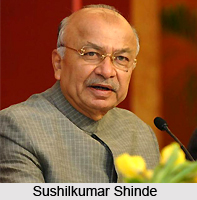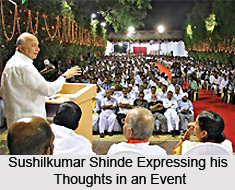 Sushilkumar Shinde or Sushilkumar Sambhajirao Shinde is an important name among Indian Politicians who hails from the western Indian state of Maharashtra. Currently, he is the Minister of Home Affairs. He was the Cabinet Minister for Power under the tenure of Dr. Manmohan Singh, from 29th January, 2006 till 31st July, 2012. He rendered his services as the Chief Minister of Maharashtra during the period from 18th January till October 2004 and he is also the Leader of the House in Lok Sabha. He is the first Dalit person to become the Chief Minister of Maharashtra. He is the leader of the Indian National Congress.
Sushilkumar Shinde or Sushilkumar Sambhajirao Shinde is an important name among Indian Politicians who hails from the western Indian state of Maharashtra. Currently, he is the Minister of Home Affairs. He was the Cabinet Minister for Power under the tenure of Dr. Manmohan Singh, from 29th January, 2006 till 31st July, 2012. He rendered his services as the Chief Minister of Maharashtra during the period from 18th January till October 2004 and he is also the Leader of the House in Lok Sabha. He is the first Dalit person to become the Chief Minister of Maharashtra. He is the leader of the Indian National Congress.
Early Life of Sushilkumar Shinde
Sushilkumar Shinde was born to a very poor Hindu Kakkaya-Dhor family on 4th September 1941 to father Sambhaji Rao Shinde and mother Sakhu Bai. He did his B.A. (Hons.) and L.L.B. from Dayanand College, Solapur and Shivaji University, Kolhapur. He also attended New Law College, University of Mumbai, Maharashtra. He started his career as sub-inspector of police. He also studied law.
 Political Career of Sushilkumar Shinde
Political Career of Sushilkumar Shinde
Sushilkumar Shinde commenced his career as a bailiff in the session`s court of Solapur, and he had worked there till the year 1965, since 1957. He later associated himself with the Maharashtra State Police, as a constable. Besides, he also provided his services for the Maharashtra state C.I.D. for a period of six years, as a sub-inspector of police, under Amukuraj Patil, his C.I.D. mentor.
Shinde became a member of the Congress party in the year 1971. Three years later he again contested an assembly election from Karmala in Solapur and won by 25,000 votes. He was honoured with the post of a Junior Minister in V. P. Naik`s Government. Sushilkumar Shinde rejoined the Congress Party and became the finance minister in the new Vasantdada Patil`s Government. He won Maharashtra State Assembly elections in 1978, 1980, 1985 and 1990. In 1999, he acted as campaign manager of the congress chairperson Sonia Gandhi in Amethi, Uttar Pradesh. On October 30, 2004, he was appointed the Governor of Andhra Pradesh. On January 29, 2006 he resigned and left office.
Sushilkumar Shinde was also elected to the Rajya Sabha in 1998 and 2006. After the election of Pranab Mukherjee as the President of India, he became the leader of the ruling party in Lok Sabha. From 2006 to 2012 he was designated as the Power Minister of India while in 2012 he got elected as the Home Minister of India. He however got defeated in the 2014 Lok Sabha elections by a wide margin.
Achievements of Sushilkumar Shinde
The National Citizens Award has been presented to Sushilkumar Shinde during the years 1993 and 1994 in recognition of his outstanding contribution to the field of Parliamentary Procedure. The award was also granted to him for placing the most number of queries while he presented nine successive finance budgets as the Finance Minister of Maharashtra.
Personal Life of Sushilkumar Shinde
Sushilkumar Shinde is married to Ujwala S. Shinde since 1st May 1970 and the couple has three daughters. One of his daughters, Praniti Shinde, is an MLA representing Solapur constituency in Maharashtra.
Positions Held by Sushilkumar Shinde
| Year | Positions Held |
| 1974 - 92 | Member, Maharashtra Legislative Assembly |
| 1974 - 75 | Minister of State for Sports and Cultural Affairs, Government of Maharashtra |
| 1975 - 77 | Minister of State for Finance, Family Welfare, Sports and Cultural Affairs, Government of Maharashtra |
| 1978 | Cabinet Minister for Labour and Tourism, Government of Maharashtra |
| 1983 - 85 | Cabinet Minister for Finance, Planning, Sports and Cultural Affairs, Government of Maharashtra |
| 1985 | Cabinet Minister for Finance, Planning, Environment, Government of Maharashtra |
| 1986 | Cabinet Minister for Finance, Planning, Industry, Law and Judiciary, Social Welfare, Government of Maharashtra |
| 1988-90 | Cabinet Minister for Finance, Cultural Affairs, Sports and Planning, Government of Maharashtra |
| 1990 | Cabinet Minister for Urban Development, Government of Maharashtra |
| 1991 | Cabinet Minister for Urban Development, Law and Judiciary, Government of Maharashtra |
| 1992 | Elected to Rajya Sabha |
| 1998 - 99 | Member of Twelfth Lok Sabha |
| 1999 - 2003 | Member, Thirteenth Lok Sabha |
| 2003 - 2004 | Member, Maharashtra Legislative Assembly |
| 2004 | Chief Minister, Maharashtra |
| 2004 - 2006 | Governor of Andhra Pradesh |
| 2006 | Member, Rajya Sabha and Union Cabinet Minister, Power |
| 2009 | Re-elected to 15th Lok Sabha |
| 31st May 2009 - 31st July | Union Cabinet Minister, Power |
| Aug. 2012 | Union Cabinet Minister, Home Affairs |
| 3rd Aug. 2012 | Leader of the House, Lok Sabha |






